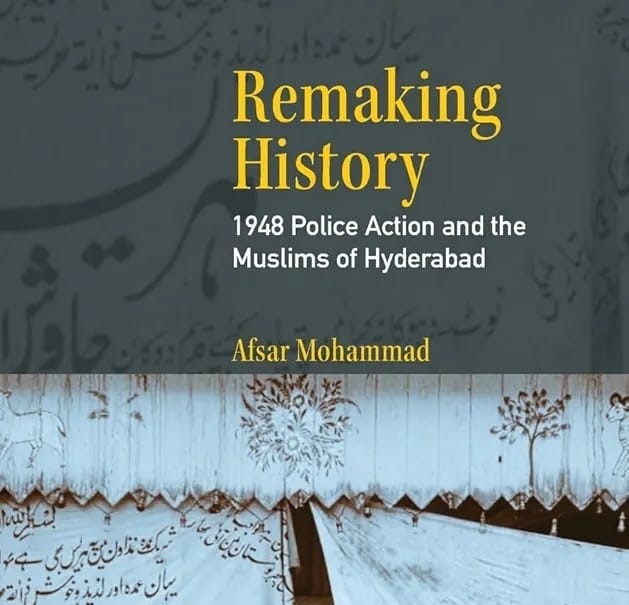Book: Remaking History: 1948 Police Action and the Muslims of Hyderabad
Author: Afsar Mohammad
Publisher: Cambridge University Press
Published: June 2023
Hardcover: 320 pages
Review by: Ayesha Sultana
Afsar Mohammad, a renowned poet, scholar, and expert on South Asian literary cultures, brings forth a deeply researched and compelling narrative in his book Remaking History: 1948 Police Action and the Muslims of Hyderabad. As a professor of South Asian Studies at the University of Pennsylvania, Afsar has extensively studied the intersection of politics, religion, and literature in the Indian subcontinent. His previous works have explored themes of religious identity and cultural expression in the context of Hyderabad. With Remaking History, he delves into one of the most tragic and often overlooked episodes in India’s postcolonial history – the 1948 police action in Hyderabad.
The book addresses the military operation launched by the Indian government from September 14 to 18, 1948, to forcibly integrate the princely state of Hyderabad into the Indian Union. As India was celebrating its newfound independence, the state of Hyderabad was caught in a violent struggle. The operation, commonly referred to as the “police action,” resulted in immense bloodshed, with the Muslim population of Hyderabad suffering disproportionately.
Hyderabad, known for its grandeur and the unique confluence of Hindu-Muslim culture, found itself at a crossroads of political and religious tensions. Afsar Mohammad sheds light on the brutal military campaign, where the ordinary citizens of Hyderabad became casualties in a political power play between the Nizam and the Indian government. The book emphasizes that while the Razakars, a military group loyal to the Nizam, escaped across borders, it was the common Muslims of Hyderabad who bore the brunt of the violence that followed the military intervention. Thousands of lives were lost, and many more were displaced during the five days of turmoil.
One of the pivotal aspects of the book is its reliance on the Sunderlal Committee Report, an investigation commissioned by Prime Minister Jawaharlal Nehru in the immediate aftermath of the operation. This committee traveled across Hyderabad and the Deccan region, gathering firsthand testimonies from survivors. The report revealed shocking truths: thousands of Muslims were massacred during the police action, and the violence forced many others to flee to Pakistan and other countries. However, the report was suppressed for decades under the guise of “national security,” only surfacing in recent years thanks to the persistent efforts of historians. This suppression of critical historical evidence is a central theme of the book, as Afsar Mohammad argues that official narratives have long ignored or downplayed the extent of the violence.
In addition to exposing the atrocities committed, Remaking History explores how this dark period shaped the literary and cultural landscapes of postcolonial Hyderabad. The traumatic events of 1948 found their way into novels, poems, memoirs, and personal narratives written by survivors and their descendants. Afsar Mohammad highlights how literature became a means for the people of Hyderabad to process their grief, remember their dead, and make sense of the immense suffering they endured. The book documents the ways in which Hyderabad’s writers and poets used their work to preserve the memory of the police action, even as the official narrative sought to erase or obscure these painful truths.
Afsar Mohammad also critically examines the political reframing of the police action in later years. In 1998, L.K. Advani, a key figure in India’s Hindutva movement, proclaimed the police action as a “liberation” of Hyderabad, casting it as a moment of triumph rather than tragedy. This reinterpretation of history, the book argues, was part of a larger effort to further a communal agenda, obscuring the fact that the violence was largely directed at Muslims. Afsar Mohammad challenges readers to question whether the police action was truly a moment of liberation, or if it was a tool used to suppress the region’s Muslim population and further political interests.
One of the most striking aspects of Remaking History is the emphasis on the role of personal stories in reconstructing the past. Afsar Mohammad stresses that official documents and reports can only go so far in revealing the full picture. The true history, he argues, is often found in the personal memoirs, oral histories, and forgotten novels of those who lived through these events. Many of the eyewitnesses and survivors of the 1948 police action are no longer alive, their stories lost to time. However, the book insists that these personal accounts are essential to understanding the true scope of the violence and its lasting impact on Hyderabad.
The book also highlights the lasting cultural and social shifts that emerged from the violence. Despite the bloodshed, Hyderabad’s centuries-old legacy of Hindu-Muslim unity endured, and the city’s cultural landscape continued to evolve. In the years following the police action, a wave of literary and artistic movements arose, particularly in the Telangana region, shaping the social and cultural identity of Hyderabad for generations to come.
Afsar Mohammad’s Remaking History is a crucial work that brings much-needed attention to a neglected chapter in India’s postcolonial history. It challenges the sanitized narratives of Indian nationalism and raises important questions about the consequences of political violence. By combining rigorous historical research with a deep understanding of Hyderabad’s literary cultures, Afsar Mohammad presents a nuanced and powerful account of the 1948 police action and its aftermath. The book serves as both a historical investigation and a tribute to the resilience of Hyderabad’s people and culture in the face of adversity.
In conclusion, Remaking History is an essential contribution to the historiography of postcolonial India. It calls on readers to confront the uncomfortable truths of the past and reflects on how history is often manipulated to serve political agendas. Afsar Mohammad’s work is a timely reminder that the trauma of violence and suppression should not be forgotten, but instead, recognized and remembered in its entirety, for the sake of future generations.




